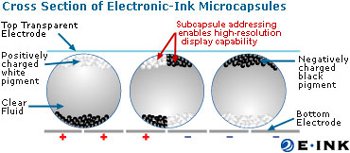Electronic paper (or e-paper) is a collective name for display technologies that resembles real paper - in terms of display clarity, sunlight readability, thickness, non-volatility and flexibility. You can find e-paper displays in e-readers, electronic shelf labels, wearables and more.
E-Paper features
Most e-paper displays will feature the following:
- High display clarity
- Sunlight visibility
- Low power consumption: a true e-paper display is bi-stable (non-volatile) and does not draw power when the image does not change
- Flexibility
- Thin form factor
E-Paper technologies
There are many possible e-paper technologies. The leading technology by far is E Ink (brand by E Ink Holdings) which holds a market share of over 90% and is used in e-readers, shelf labels, wearables, e-notebooks and more.
E Ink displays are Electrophoretic (a science which was actually discovered back in 1807 and deals with particle motion as influenced by electric field): these displays are made of tiny capsules (0.04 mm in diameter) that contain two kinds of particles: black and white. Using electricity you can choose whether the white or black particles will rise to the top of the capsule - and so change the color of the pixel.
Those particles remain in place when no electricity is used - and so the displays do not need power when the image does not change. E Ink also offers color e-paper by using color filters on top of the black and white display or by using pigmented particles.

- Electrowetting: uses voltage is used to modify the wetting properties of a solid material, can enable highly efficient displays -but is not commercialized yet.
- CLEARInk: these displays use a reflector film that can vary its brightness by modulating the total internal reflection of ambient light from film.
- Memory LCD: Memory-In-Place (MIP) LCDs are not exactly e-paper, but these reflective LCDs with a built-in memory per pixel offer an extremely low power consumption (around 1/50 to 1/1000 that of a regular LCDs!). These displays are in production by Sharp, Japan Display and Kyocera.
- Other technologies: In the we have seen many other technologies and display brands that aimed to penetrate the e-paper market but did not succeed, including Phase Change displays, AUO Sipix, Qualcomm Mirasol, Pixel Qi, Bridgestone QD-LPD and more.
Where can I find e-paper displays?
The largest e-paper market today is found with e-readers, led by Amazon's Kindle devices. Other products include mobile phones, wearables, electronic shelf labels and more.

